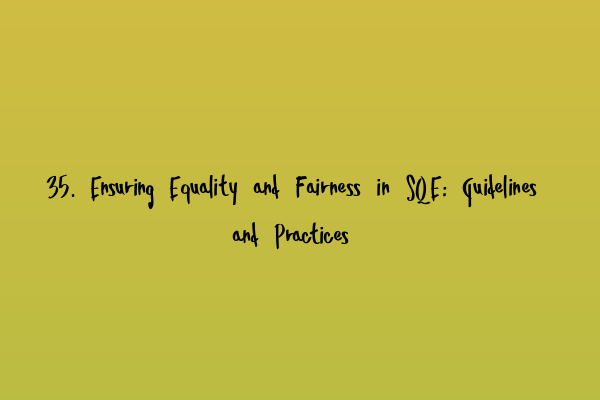35. Ensuring Equality and Fairness in SQE: Guidelines and Practices
As the Solicitors Qualifying Examination (SQE) becomes the new route for aspiring solicitors to qualify in England and Wales, it is crucial to ensure equality and fairness in the examination process. Promoting diversity and inclusivity in the legal profession is not only ethically important but also essential for maintaining the credibility and integrity of the SQE.
In this article, we will discuss guidelines and practices to ensure equality and fairness in the SQE, enabling all candidates to have an equal opportunity to showcase their knowledge and skills. We will explore various aspects, including unbiased question formulation, accessibility, reasonable adjustments, and the role of technology in enhancing fairness.
Unbiased Question Formulation
Creating unbiased examination questions is crucial for ensuring equity in the SQE. The questions should not disadvantage any particular group or be biased towards a specific background or experience. Exam setters should ensure that questions are formulated in a way that allows all candidates, regardless of their socioeconomic status, ethnicity, or educational background, to have an equal chance of providing a correct response.
Exam setters should undergo training on question formulation and bias awareness. This training should focus on eliminating any subconscious bias and ensuring the questions are fair and objective. Additionally, diverse subject matter experts should be involved in the question formulation process to prevent any unintentional bias.
To further enhance fairness, a question review committee comprising experts from diverse backgrounds can be formed. This committee will review the questions before the examination to identify any potential bias and ensure the questions meet the standards of fairness and equality.
Accessibility for All Candidates
Accessibility plays a crucial role in ensuring equality in the SQE. It is essential that the examination is accessible to all candidates, including those with disabilities or special needs. The SQE governing body should work closely with accessibility experts to develop guidelines and practices for accommodating candidates with different requirements.
Reasonable adjustments should be made for candidates with disabilities or special needs, such as providing additional time, accessible examination materials, or appropriate assistive technology. These adjustments aim to create a level playing field for all candidates and enable them to demonstrate their knowledge and skills without any disadvantage.
The SQE governing body should establish a clear process for requesting and implementing reasonable adjustments. Candidates should be encouraged to disclose their requirements in a confidential manner to ensure their needs are adequately met during the examination.
Technology and Fairness
The use of technology can greatly enhance fairness in the SQE. Online examination platforms can provide features such as flagged questions, highlighting, and navigation aids, allowing candidates to easily navigate through the examination and manage their time effectively.
Furthermore, the use of AI-powered technology for automated marking can help eliminate any potential bias in the scoring process. The algorithms can be designed to evaluate responses based on objective criteria, ensuring consistency and fairness in the marking process.
It is important to regularly review and assess the technological systems used in the SQE to ensure they remain fair and do not inadvertently introduce bias or disadvantages to any candidates.
Conclusion
Ensuring equality and fairness in the SQE is of utmost importance to maintain the credibility and integrity of the examination. By following unbiased question formulation techniques, providing accessibility for all candidates, and harnessing the power of technology, the SQE can truly become a fair and inclusive assessment that promotes diversity in the legal profession.
Related Articles:
